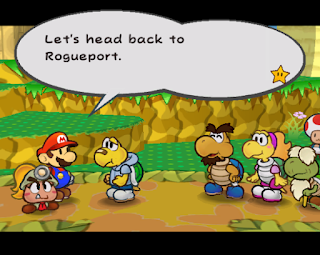The game has been so eager to send players to the gameplay this time around, Chapter 1 of TTYD has picked up a few extra burdens from the Prologue of 64, although they've done their best to keep it to a minimum.
The first "half" of the Chapter is about going to Petalburg, finding out what's been afflicting the town, and progressing on a quick fetch quest to go pick up the keys to the dungeon. Shhwonk Fortress, like the Fuzzy invasion of 64, has no relevance to anything and could've been excised from the story entirely without losing anything. In a more traditional RPG, the story of this chapter would have been a satisfying self-contained Town Story with Kroop giving you the keys to Hooktail's Castle directly, Koops joining immediately, and then straight to Hooktail. TTYD wants a little more substance to the Chapter, though, and adds some archaeology for Goombella to geek out over (exclusively in Tattles), a funny setpiece with the Thwomp quizmaster, and a visit to some Fuzzies. Good for padding and a level or two, mostly. Did we have to fight two monsters weak to POW Blocks on the way?
Hooktail Castle is a far stronger element to the story, but that's a matter of course. Kooper was very vague about his reasons for joining, and his story is relevant later on. Koops gets to be more directly focused on Hooktail herself, with a reason for joining and a character based entirely around that reason- his trauma from losing his father has suppressed his drive to do, and he wants closure on this chapter of his life before he can become a Koopa in his own right. Within the castle itself, we see him react to his father's legacy (before realising it's actually someone else's) and... blush at a cat burglar. TTYD has some concepts for amazing stories, but without Party Chat and a limited interest in giving dialogue to a single relevant party member, the game must use the start and the end of its stories for all the development and trust the reader to fill in the blanks with the gameplay. Not an unreasonable expectation- especially for a Mario game- but it does betray the essence of the genre and the expectations TTYD itself has cultivated, just a smidge.
On a related note, Hooktail herself is a very underdeveloped antagonist. She only appears in dragon at the very end of the journey, characterises herself exclusively as a glutton (down to her weakness being based on a particularly unpleasant experience with food poisoning), and her trickster nature is thrown in so late that they had to squeeze a mention of it in Mr. Jones's letter to make it feel the slightest bit foreshadowed. We have a trickster dragon, terrorising the people of multiple villages, the murderer of Koops's father and master of undead hordes, resident of a castle full of tricks and traps... and Hooktail is just hungry. We barely even know if the castle was built for her or if she became a resident after the fact- and if the latter, when! Part of this may be in service of her gender reveal: they don't want to use too much of her because they don't want to have to be forced to gender her early so it can be surprise when, much later, it turns out she was a girl. That may be the best counterargument for the existence of that joke I could make, beyond any sort of commentary on how that impacts trans, non-binary, and just women in general. Yes, that stuff is important, but look at how badly Hooktail herself got short-changed just so they could tell the joke at all!
Mechanically, this is an excellent showcase of TTYD's strengths as a game- it re-establishes all the old stuff to people who skipped 64, shows off some neat puzzles and strategic depth, and makes sure the player is thinking about all the systems the game has in place early. Combined with the shorter Prologue allowing players to get to this point far quicker, and TTYD's opening is better than 64's by a long shot. The weaknesses of the chapter, aside from perhaps the dull music that this game kinda has a general issue with, are that it is also getting the player ready to deal with all the bad mechanics TTYD introduced. Stage drops, audience heckling, enemies holding and using items, enemies ignoring the leader and dealing a large amount of proportional damage to a wounded rear line... the worst the game has to offer won't come into play yet, and that may just be what saves the game in the end. The game gets far more irritating later, after some more interesting story nuggets have been introduced. This is definitely not intentional- the devs either thought you'd enjoy or be amused by the stage's many faults- but it would filter out people who are less invested in the story.

















































